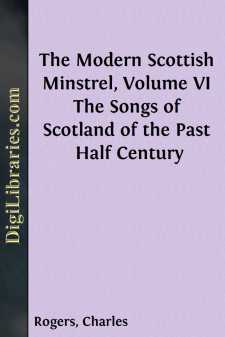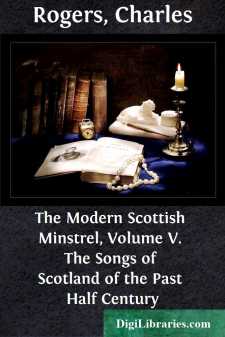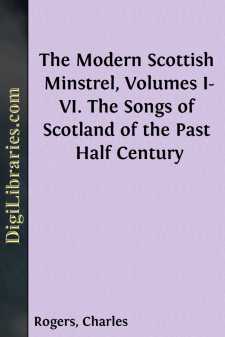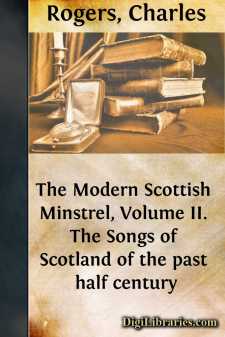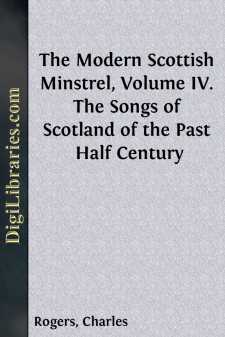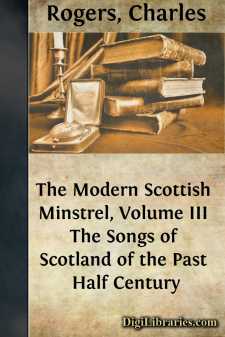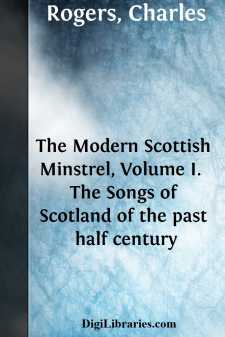Categories
- Antiques & Collectibles 13
- Architecture 36
- Art 48
- Bibles 22
- Biography & Autobiography 813
- Body, Mind & Spirit 142
- Business & Economics 28
- Children's Books 15
- Children's Fiction 12
- Computers 4
- Cooking 94
- Crafts & Hobbies 4
- Drama 346
- Education 46
- Family & Relationships 57
- Fiction 11828
- Games 19
- Gardening 17
- Health & Fitness 34
- History 1377
- House & Home 1
- Humor 147
- Juvenile Fiction 1873
- Juvenile Nonfiction 202
- Language Arts & Disciplines 88
- Law 16
- Literary Collections 686
- Literary Criticism 179
- Mathematics 13
- Medical 41
- Music 40
- Nature 179
- Non-Classifiable 1768
- Performing Arts 7
- Periodicals 1453
- Philosophy 64
- Photography 2
- Poetry 896
- Political Science 203
- Psychology 42
- Reference 154
- Religion 513
- Science 126
- Self-Help 84
- Social Science 81
- Sports & Recreation 34
- Study Aids 3
- Technology & Engineering 59
- Transportation 23
- Travel 463
- True Crime 29
The Modern Scottish Minstrel, Volume VI The Songs of Scotland of the Past Half Century
by: Charles Rogers
Categories:
Description:
Excerpt
INTRODUCTION.
As if pointing to a condition of primeval happiness, Poetry has been the first language of nations. The Lyric Muse has especially chosen the land of natural sublimity, of mountain and of flood; and such scenes she has only abandoned when the inhabitants have sacrificed their national liberties. Edward I., who massacred the Minstrels of Wales, might have spared the butchery, as their strains were likely to fall unheeded on the ears of their subjugated countrymen. The martial music of Ireland is a matter of tradition; on the first step of the invader the genius of chivalric song and melody departed from Erin. Scotland retains her independence, and those strains which are known in northern Europe as the most inspiriting and delightful, are recognised as the native minstrelsy of Caledonia. The origin of Scottish song and melody is as difficult of settlement as is the era or the genuineness of Ossian. There probably were songs and music in Scotland in ages long prior to the period of written history. Preserved and transmitted through many generations of men, stern and defiant as the mountains amidst which it was produced, the Minstrelsy of the North has, in the course of centuries, continued steadily to increase alike in aspiration of sentiment and harmony of numbers.
The spirit of the national lyre seems to have been aroused during the war of independence, and the ardour of the strain has not since diminished. The metrical chronicler, Wyntoun, has preserved a stanza, lamenting the calamitous death of Alexander III., an event which proved the commencement of the national struggle.
"Quhen Alysandyr oure kyng wes dede,That Scotland led in luve and le,
Away wes sons of ale and brede,
Of wyne and wax, of gamyn and gle:
Oure gold wes changyd into lede.
Cryst, borne in-to virgynyté
Succour Scotland and remede,
That stad is in perplexyté."
The antiquity of these lines has been questioned, and it must be admitted that the strain is somewhat too dolorous for the times. Stung as they were by the perfidious dealings of their own nobility, and the ruthless oppression of a neighbouring monarch, the Minstrels sought every opportunity of astirring the patriotic feelings of their countrymen, while they despised the efforts of the enemy, and anticipated in enraptured pæans their defeat. At the siege of Berwick in 1296, when Edward I. began his first expedition against Scotland, the Scottish Minstrels ridiculed the attempt of the English monarch to capture the place in some lines which have been preserved. The ballad of "Gude Wallace" has been ascribed to this age; and if scarcely bearing the impress of such antiquity, it may have had its prototype in another of similar strain. Many songs, according to the elder Scottish historians, were composed and sung among the common people both in celebration of Wallace and King Robert Bruce.
The battle of Bannockburn was an event peculiarly adapted for the strains of the native lyre. The following Bardic numbers commemorating the victory have been preserved by Fabyan, the English chronicler:—
"Maydens of Englande,Sore may ye morne,
For your lemmans, ye
Haue lost at Bannockysburne.
With heue-a-lowe,
What weneth the king of England,
So soon to have won Scotland?
Wyth rumbylowe."
Rhymes in similar pasquinade against the south were composed on the occasion of the nuptials of the young Prince, David Bruce, with the daughter of Edward II., which were entered into as a mean of cementing the alliance between the two kingdoms.
After the oblivion of a century, the Scottish Muse experienced a revival on the return, in 1424, of James I. from his English captivity to occupy the throne. Of strong native genius, and possessed of all the learning which could be obtained at the period, this chivalric sovereign was especially distinguished for his skill in music and poetry. By Tassoni, the Italian writer, he has been designated a composer of sacred music, and the inventor of a new kind of music of a plaintive character. His poetical works which are extant—"The King's Quair," and "Peblis to the Play"—abound not only in traits of lively humour, but in singular gracefulness. To his pen "Christ's Kirk on the Green" may also be ascribed. The native minstrelsy was fostered and promoted by many of his royal successors. James III., a lover of the arts and sciences, delighted in the society of Roger, a musician; James IV....


